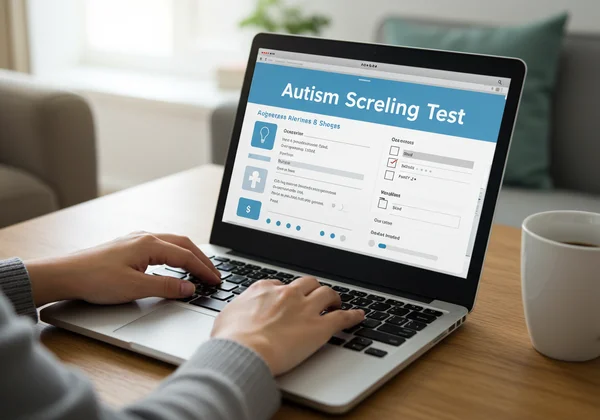Adult Autism: Signs, Diagnosis & Taking an Online Test
October 11, 2025 | By Seraphina Rivers
Have you ever felt like you experience the world differently than those around you? As an adult, questioning your own neurotype can be a confusing yet enlightening journey. Many adults spend years feeling misunderstood before they begin to wonder, do i have autism test results that could offer clarity? This comprehensive guide is here to walk you through the landscape of Adult Autism, exploring its signs, the formal diagnostic process, and how a confidential online screening can be a valuable first step. Your path to self-understanding starts here. Taking an online autism test can be a profound first step on that path.

What is Adult Autism? Understanding the Spectrum
Autism Spectrum Disorder (ASD) is a neurodevelopmental difference that affects how a person communicates, interacts with others, and experiences the sensory world. The term "spectrum" is key—it highlights the vast diversity within the autistic community. There is no single way to be autistic. Understanding this is the first step toward moving past outdated stereotypes and recognizing the true nature of adult autism.
Defining Autism Spectrum Disorder in Adulthood
In adulthood, autism is not something you develop; it's a part of your neurobiology that has been present since childhood. However, it often goes unrecognized until later in life. For adults, the core characteristics remain the same: persistent differences in social communication and the presence of restricted or repetitive behaviors and interests. The manifestation of these traits, however, can be far more subtle and complex than in children, shaped by years of life experience and learned coping strategies.
Moving Beyond Stereotypes: Diverse Presentations of Autism
Forget the stereotypical portrayals you may have seen in media. Autism presents in countless ways across all genders, races, and backgrounds. Many autistic adults are successful professionals, parents, and artists. They may have learned to navigate social situations effectively, even if it requires significant mental energy. Recognizing this diversity is crucial for identifying autism in yourself or others who don't fit a narrow, preconceived mold.
Recognizing the Key Signs of Autism in Adults
The signs of autism in adults can be subtle and are often internalized. They are not flaws or defects but simply a different way of processing and interacting with the world. Many adults discover that these lifelong traits finally make sense when viewed through the lens of autism.
Social Communication & Interaction Differences
This area involves more than just being shy or introverted. Autistic social differences might include finding small talk confusing or exhausting, preferring deep conversations on specific topics. You might struggle to interpret non-verbal cues like body language or tone of voice, or you may find it difficult to initiate and maintain friendships despite desiring connection. Many autistic adults report feeling like they are performing or "acting" in social situations.
Restricted, Repetitive Behaviors & Intense Interests
This category is widely misunderstood. Repetitive behaviors, or "stimming," are often self-regulating actions like fidgeting, pacing, or humming that help manage anxiety or sensory input. For adults, these can be very subtle. Intense, passionate interests in specific subjects, often called "special interests," are another hallmark. These are more than hobbies; they are a source of deep joy, comfort, and expertise. If you've ever spent hours completely absorbed in a topic, you might recognize this trait.
Sensory Sensitivities and Executive Function Challenges
Do you find fluorescent lights overwhelming or certain textures unbearable? Sensory sensitivities are a core part of the autistic experience. This can mean being hypersensitive (overly responsive) to sounds, lights, or touch, or hyposensitive (under-responsive). Additionally, many autistic adults experience challenges with executive function—the mental processes that help us plan, organize, and complete tasks. This can manifest as difficulty managing time, starting projects, or adapting to unexpected changes. If these challenges resonate, you can start your screening today to gain more insight.
The Phenomenon of Masking: Autism in Women and Others
Masking, or camouflaging, is the process of consciously or unconsciously suppressing natural autistic traits to fit in with neurotypical peers. This is particularly common in women and individuals assigned female at birth, leading to significant rates of underdiagnosis. Masking can involve forcing eye contact, mimicking the social behaviors of others, and hiding stims. While it can be an effective short-term survival strategy, it is mentally and emotionally exhausting and can lead to burnout and a lost sense of self. An online autism test for women can be a starting point for those who suspect they may be masking.

Navigating the Adult Autism Assessment Journey
If you recognize yourself in these descriptions, you might be wondering what to do next. The journey toward an adult autism test and potential diagnosis has several stages, each serving a unique purpose in your path to self-discovery.
The Role of Online Autism Screeners
An online autism test is an excellent and accessible first step. Reputable screening tools, like the one offered on this site, are based on scientifically validated questionnaires. They are designed to help you identify whether you have a significant number of autistic traits. It is crucial to understand that these are screening tools, not diagnostic instruments. They cannot tell you for certain if you are autistic, but they can provide valuable data and the confidence to take the next step. A free autism screening can offer immediate, private insights into your experiences.

What to Expect from a Professional Diagnostic Assessment
A professional diagnosis is conducted by a qualified clinician, such as a psychologist or psychiatrist with expertise in adult autism. The process is comprehensive and typically involves several steps. These include detailed interviews about your developmental history, current challenges, and strengths. You may also complete standardized questionnaires and participate in observational assessments. Unlike a preliminary autism test online, a professional diagnosis is a deep, multi-faceted process. The goal is to build a complete picture of who you are to determine if you meet the criteria for Autism Spectrum Disorder. An initial screening, such as a confidential RAADSR autism test, can provide a solid foundation for this professional discussion.
Can You Self-Diagnose Autism? Understanding Its Limitations
The topic of self-diagnosis is widely discussed within the autistic community. Many view it as a valid process of self-identification, especially given the significant barriers (cost, access, clinician bias) to formal diagnosis. Researching autism extensively and relating deeply to the lived experiences of other autistic people can be a powerful form of self-discovery. However, a formal diagnosis is often necessary to access workplace accommodations, support services, and medical validation. An initial autism spectrum test can be a key part of this self-discovery process.
Living & Thriving with Adult Autism on Your Own Terms
While an autism test offers initial insights, the true journey begins with self-acceptance. Understanding that you may be autistic is not an endpoint; it's the beginning of a new chapter of empowerment. It provides a framework to understand your needs, honor your strengths, and develop strategies for navigating a world not always built for your neurotype.
Common Co-occurring Conditions (Anxiety, ADHD, Depression)
It is very common for autistic individuals to have one or more co-occurring conditions. Anxiety disorders and depression are particularly prevalent, often stemming from the stress of navigating a neurotypical world and the exhaustion of masking. Attention-Deficit/Hyperactivity Disorder (ADHD) also has a high rate of overlap with autism, sharing traits related to executive function and focus. Recognizing these connections is vital for receiving comprehensive support.
Practical Strategies for Daily Life & Well-being
Living well as an autistic adult often involves creating an environment that supports your needs. This can mean using noise-canceling headphones to manage sensory overload, using planners and apps to aid executive function, or scheduling downtime to recover from social events ("social hangovers"). It's about giving yourself permission to do what works for you, rather than forcing yourself to fit a neurotypical mold.

Building a Supportive Network & Community
Connecting with other autistic people can be a life-changing experience. Finding your community, whether online or in person, validates your experiences and provides a space where you don't have to mask. Sharing strategies, celebrating successes, and finding solidarity can combat feelings of isolation and build a strong sense of identity and belonging.
Empowering Your Journey: Next Steps in Understanding Adult Autism
Exploring the possibility of adult autism is a courageous step toward authentic self-knowledge. From recognizing the subtle signs within yourself to understanding the path toward assessment, you are gathering the tools to better understand your unique mind. Remember, this journey is about understanding, not about finding something "wrong."
Whether you're just starting to ask questions or are ready to seek formal assessment, a reliable screening can provide the clarity you need to move forward. Take the first step today by using a confidential and insightful tool designed to help you on your path.

Frequently Asked Questions About Adult Autism & Screening
How accurate are online autism tests for adults?
Reputable online autism tests, when based on scientific research, can be highly accurate as screening tools. They reliably indicate whether an individual possesses a significant number of autistic traits that warrant a professional evaluation. However, they cannot provide a formal diagnosis. Think of them as a well-informed first opinion, not a final conclusion.
What does a high score on an online autism test indicate?
A high score suggests that your self-reported experiences and traits align closely with those commonly associated with Autism Spectrum Disorder. It is strong evidence that pursuing a formal assessment with a qualified professional is a logical and worthwhile next step. It's a data point that empowers you to have a more informed conversation with a healthcare provider. You can discover your results on our homepage.
How can autism present differently in adult females?
Autism often presents differently in females due to a greater tendency toward "masking" or camouflaging social difficulties. Their interests may be seen as more socially acceptable (e.g., literature, animals) and their challenges are more likely to be internalized, leading to conditions like anxiety and depression. This is why many females go undiagnosed until adulthood.
What are the next steps after taking an online autism test?
After completing an online autism screening, the best next step is to schedule an appointment with a doctor or mental health professional. You can bring your results with you to start a conversation about your concerns and ask for a referral to a specialist who can conduct a formal diagnostic assessment for adult autism.